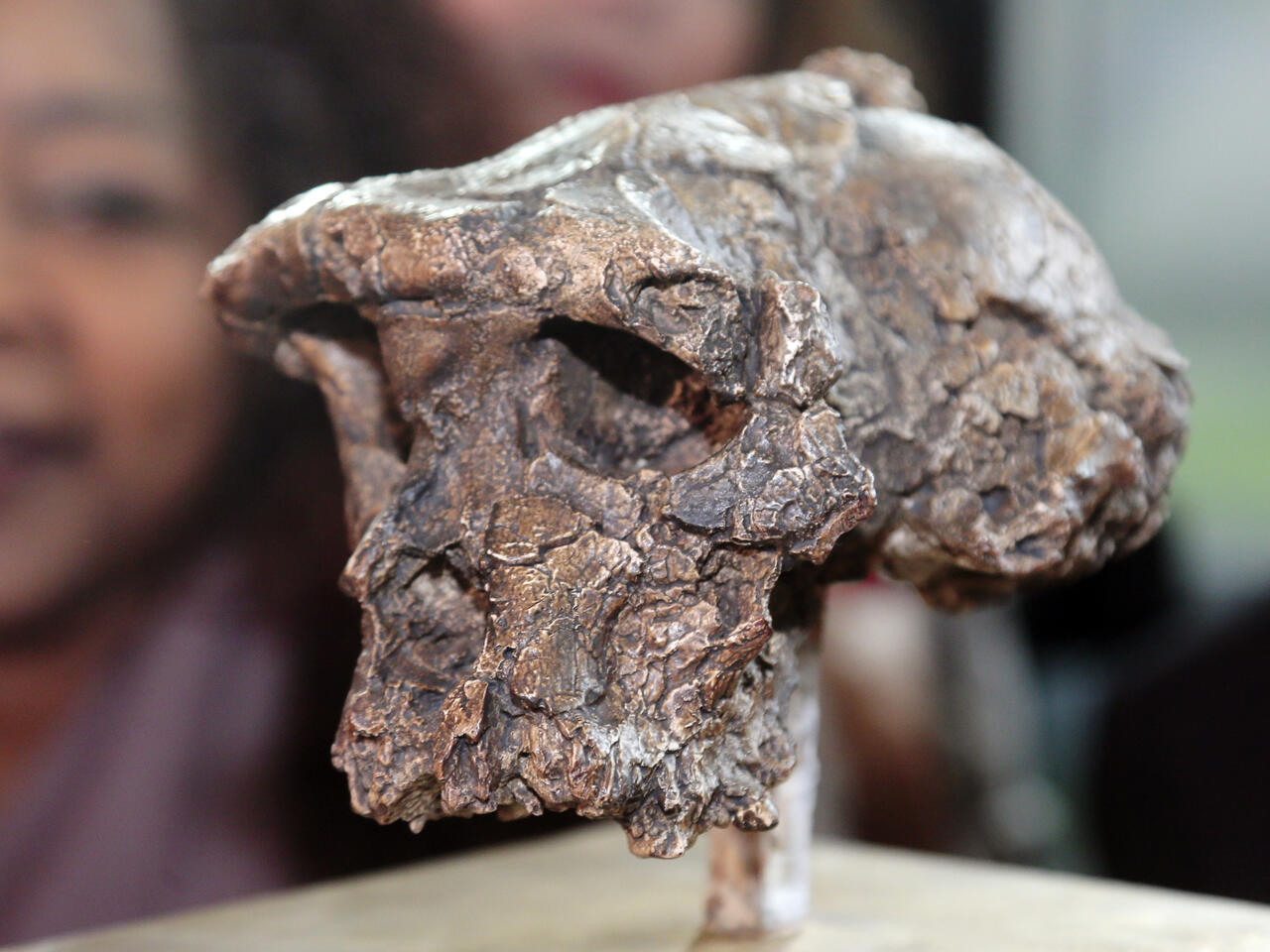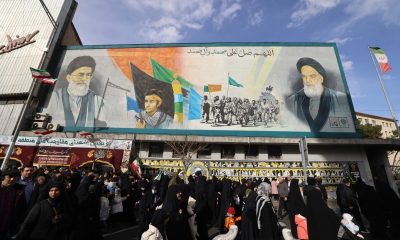International
Oldest human relative walked upright 7 mn years ago: study

AFP
The earliest known human ancestor walked on two feet as well as climbing through trees around seven million years ago, scientists said Wednesday after studying three limb bones.
When the skull of Sahelanthropus tchadensis was discovered in Chad in 2001, it pushed back the age of the oldest known representative species of humanity by a million years.
Nicknamed “Toumai”, the nearly complete cranium was thought to indicate that the species walked on two feet because of the position of its vertebral column and other factors.
However the subject triggered fierce debate among scientists, partly due to the scarcity and quality of the available bones, with some even claiming that Toumai was not a human relative but just an ancient ape.
In a study published in the Nature journal on Wednesday, a team of researchers exhaustively analysed a thigh bone and two forearm bones found at the same site as the Toumai skull.
“The skull tells us that Sahelanthropus is part of the human lineage,” said paleoanthropologist Franck Guy, one of the authors of the study.
The new research on the limb bones demonstrates that walking on two feet was its “preferred mode of getting around, depending on the situation,” he told a press conference.
But they also sometimes moved through the trees, he added.
– ‘Not a magical trait’ –
The leg and arm bones were found alongside thousands of other fossils in 2001, and the researchers were not able to confirm that they belonged to the same individual as the Toumai skull.
After years of testing and measuring the bones, they identified 23 characteristics which were then compared to fossils from great apes as well as hominins — which are species more closely related to humans than chimpanzees.
They concluded that “these characteristics are much closer to what would be seen in a hominin than any other primate,” the study’s lead author Guillaume Daver told the press conference.
For example, the forearm bones did not show evidence that the Sahelanthropus leaned on the back of its hands, as is done by gorillas and chimpanzees.
The Sahelanthropus lived in an area with a combination of forests, palm groves and tropical savannahs, meaning that being able to both walk and climb through trees would have been an advantage.
There have been previous suggestions that it was the ability to walk on two feet that drove humans to evolve separately from chimpanzees, putting us on the path to where we are today.
However the researchers emphasised that what made Sahelanthropus human was its ability to adapt to its environment.
“Bipedalism (walking on two legs) is not a magical trait that strictly defines humanity,” paleontologist Jean-Renaud Boisserie told the press conference.
“It is a characteristic that we find at the present time in all the representatives of humanity.”
– Our ‘bushy’ family tree –
Paleoanthropologist Antoine Balzeau of France’s National Museum of Natural History said the “extremely substantial” study gives “a more complete image of Toumai and therefore of the first humans”.
It also bolstered the theory that the human family tree is “bushy”, and was not like the “simplistic image of humans who follow one another, with abilities that improve over time,” Balzeau, who was not involved in the research, told AFP.
Daniel Lieberman, a professor of human evolutionary biology at Harvard University, said in a linked paper in Nature that the study’s “authors have squeezed as much information as possible from the fossil data”.
But he added that the research will not offer “full resolution” of the debate.
Milford Wolpoff, a paleoanthropologist at the US University of Michigan cast doubt on whether Toumai is a hominin, telling AFP that “extraordinary claims require extraordinary evidence”.
Wednesday’s study was carried out by researchers from the PALEVOPRIM paleontology institute, a collaboration between France’s CNRS research centre and Poitiers University, as well as scientists in Chad.
Guy said the team hopes to continue its research in Chad next year — “security permitting”.
Chadian paleontologist Clarisse Nekoulnang said the team was “trying to find sites older than that of Toumai”.
International
Germany says football bodies alone will decide on possible World Cup boycott

The German Football Association (DFB) and FIFA will decide with full “autonomy” whether to boycott the upcoming World Cup, which will be hosted mainly by the United States in six months, following threats made by former U.S. president Donald Trump, the German government told AFP on Tuesday.
Trump has threatened to seize Greenland and impose higher tariffs on European countries that oppose the plan, raising political tensions between the United States and Europe.
“This assessment therefore lies with the relevant federations, in this case the DFB and FIFA. The federal government will respect that decision,” Sports State Secretary Christiane Schenderlein said in a statement emailed to AFP.
AFP had asked the German government about the possibility of a boycott of the World Cup to be jointly hosted by Canada, the United States and Mexico from June 11 to July 19.
“The federal government respects the autonomy of sport. Decisions regarding participation in major sporting events or possible boycotts fall exclusively within the responsibility of the relevant sports federations, not the political sphere,” said Schenderlein, a member of the conservative CDU, the party of Chancellor Friedrich Merz.
International
Daily Mail publisher insists reports relied on legitimate sources amid privacy trial

Two British tabloids accused of phone hacking and other forms of “unlawful information gathering” against Prince Harry and six other individuals, including singer Elton John, insisted on Tuesday that their reporting relied on legitimate sources.
Associated Newspapers Ltd (ANL), the publisher of the Daily Mail and The Mail on Sunday, sought to rebut allegations of privacy violations through illegal methods on the second day of trial at London’s High Court, following a lawsuit filed by the seven claimants.
Prince Harry, 41, who attended court hearings on both Monday and Tuesday, could be called to testify starting Wednesday in a trial expected to last up to nine weeks.
Lawyers for the claimants said the alleged illegal activities took place between 1993 and 2011, with some incidents reportedly extending as late as 2018. They argue that the tabloids hired private investigators to intercept phone calls and obtain confidential information, including detailed phone records, medical histories, and bank statements.
However, Anthony White, counsel for ANL, told the court that the trial would show the company presents “a compelling account of a pattern of lawful source acquisition” for its articles.
White added that the claims would require the court to believe that journalists and staff at the tabloids had engaged in widespread dishonesty, which the company strongly denies.
International
Death toll from southern Spain train crash rises to 40

The death toll from the train accident that occurred on Sunday in southern Spain has risen to 40, according to investigative sources cited by EFE on Monday afternoon.
Since early Monday, search operations have focused on the damaged carriages of a Renfe train bound for Huelva, which collided with the last derailed cars of an Iryo train traveling from Málaga to Madrid after it left the tracks.
The crash has also left more than 150 people injured. Of these, 41 remain hospitalized, including 12 in intensive care units at hospitals across the Andalusia region.
More than 220 Civil Guard officers are working at the site, searching the railway line and surrounding areas for key evidence to help identify victims and determine the causes of the accident.
The tragedy has revived memories of the deadliest railway disasters in Europe in recent decades. In Spain, the most severe occurred on July 24, 2013, when an Alvia train derailed near Santiago de Compostela, killing 80 people and injuring 130 others.
At the European level, the worst rail disaster took place on June 3, 1998, in Eschede, northern Germany, when a high-speed train struck a bridge pillar at 200 kilometers per hour, resulting in 98 deaths and 120 injuries.
-

 International4 days ago
International4 days agoU.S. deportation flight returns venezuelans to Caracas after Maduro’s ouster
-

 International2 days ago
International2 days agoDeath toll from southern Spain train crash rises to 40
-

 Central America3 days ago
Central America3 days agoGuatemala prison uprisings leave 46 guards held by gangs
-

 Central America2 days ago
Central America2 days agoGuatemala raises police death toll to nine after gang violence escalates
-

 International5 days ago
International5 days agoCanada accuses Iran of killing its citizen during anti-government unrest
-

 International5 days ago
International5 days agoSheinbaum highlights anti-drug gains after U.S. says challenges remain
-

 International2 days ago
International2 days agoOver 160 christian worshippers kidnapped in Kaduna Church attacks
-

 International3 days ago
International3 days agoChile declares state of catastrophe as wildfires rage in Ñuble and Biobío
-

 International4 days ago
International4 days agoFormer South Korean President Yoon sentenced to five years in prison
-

 International17 hours ago
International17 hours agoGermany says football bodies alone will decide on possible World Cup boycott
-

 International2 days ago
International2 days agoSpain’s Prime Minister pledges transparency after train crash kills at least 39
-

 International17 hours ago
International17 hours agoDaily Mail publisher insists reports relied on legitimate sources amid privacy trial


























